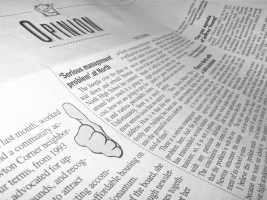Social media – everyone is talking about it. Well, politicians and media commentators seem to spend inordinate amounts of time blaming it for the ills of the world. Apparently, such things as bullying, sexism, racism, incitement and libel didn’t exist before the advent of things like Facebook and Twitter. As I’ve noted before, they seem to be putting the cart before the horse with their arguments – social media merely provides a new platform for perpetrating all of these things. Previously, you had to rely upon obscene phone calls, poison pen letters, biased newspaper reporting and so on to do these things. Social media has merely made a range of abuse far more accessible to the general public. Indeed, one might argue that it has democratised abuse – you no longer need to own a newspaper to publicly defame people on a national scale – in which case conservatives should be welcoming its influence rather than condemning it. But, as ever, its critics overstate their case when condemning social media. The reality is that it has little effect in the real world.
Not that you’d realise that if you were simply to go by social media’s high opinion of itself. Or rather, dedicated social media users’ high opinion of it. Cast your mind back, if you will, to last Autumn and the online furore caused by global outages of Facebook and Whats App. You would have thought that the end of the world was upon us. As someone who doesn’t have much time for social media, such apparently cataclysmic outages don’t really effect me, but I’m always fascinated by the frenzied reactions in engenders in those who do. Most of these reactions, of course, are expressed via the social media sites that stay up, in this case, mainly Twitter. With everything else going on at the time – yet more revelations about the shady financial dealings of the wealthy and powerful, fuel shortages, empty supermarket shelves, police scandals, all in the UK alone – it was somewhat disconcerting to see Facebook outages apparently dominating Twitter. If the trending hashtags are to be believed, that is. I learned a long time ago, though, that it is possible to get just about anything trending on Twitter, even if only for a short period, if a group of committed users simply keep tweeting their chosen hashtag. It doesn’t even have to be a big group, just so long as you can mobilise them – once it gets a bit of traction, all manner of opportunists and bots will jump on the bandwagon and keep it going for a while longer.
At which point those behind getting the hashtag going start crowing about how they’ve struck a blow for whatever ’cause’ they think they are pursuing, or against whichever ‘institution’ they think they can bring down. “Hey, look guys – we’ve got #BorisSmells trending! Wow that’s going to smash the Tories!” they undoubtedly chortle to each other on their What’s App ‘Socialist Revolution’ groups, before going back to plotting to undermine the current Labour leadership, thereby putting any chance of actually getting the Tories out even further away. Because, apparently, that’s all that modern activism is about: getting something trending on Twitter and to Hell with actually going out and campaigning, or trying to find out what it is that potential voters might actually want. Not that it matters what they think, because it is all about making gestures for the already converted. Perhaps they really do believe that they are achieving something by conducting their ‘campaigns’ via the likes of Twitter.
The trouble is that hashtags simply have no impact in the real world. If they did, then by now the Tory government would have fallen, various ministers would be facing criminal charges and Labour would have won a landslide victory under Jeremy Corbyn. Except that none of these things happened because the hashtags associated with them were never going to influence the majority of people who could make such changes, because they aren’t on Twitter and even if they are, they pay no attention to hashtags. Just as the people who get these things trending aren’t really representative of Twitter users as a whole, so Twitter users as a whole aren’t representative of the general population. They are a tiny minority.
The problem is that the activists on Twitter just don’t seem to grasp this, seemingly thinking that where they lead, the rest of the world follows. But it doesn’t. They waste their energies there, thinking that they are making a difference to the world by getting a hashtag trending instead of actually going out where it matters and trying to get their message across. On Twitter they are, by and large, simply preaching to the converted – quite literally: there’s a reason why those who subscribe to your tweets are called ‘followers’, it strongly implies that they are already receptive to your views. Which means, in practice, that those perpetuating a hashtag are those already sympathetic rather than those converted to the cause. Which, undoubtedly, is why Corbynism failed – it was an entirely self-regarding, inward looking political creed that seemingly couldn’t understand the need to persuade others over to your viewpoint, instead hectoring, brow-beating, patronising and attempting to shame those who even only mildly disagreed with them. Perfectly suited to the phoney world of social media, in other words. Expending themselves by trending meaningless catchphrases into oblivion. All of which is yet another reason that I have little time for social media: it is a fly trap that draws in people and encourages them to believe that they have a ‘voice’ and are being ‘influential’ when, in reality, they are simply talking to themselves all the time.
Doc Sleaze











